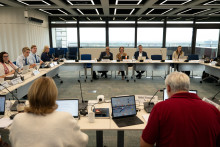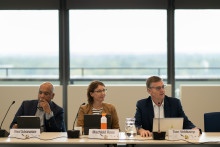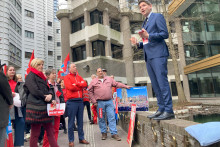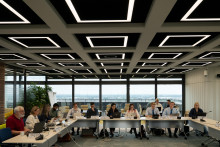The University Council's concerns about the budget were legion. The UT as a whole has budgeted a deficit of 1 percent on the first flow of funds. That is also the task for every faculty and service. At the bottom line, the UT wants to end up with a maximum of 3 million euros in the red by 2025.
Deficits
But that intended deficit of 1 percent, six UT units will not achieve that, the University Council concluded. Faculties of S&T and ITC, the DesignLab, ATLAS and the Marketing & Communication and Strategy & Policy departments expect a deficit of more than 4 percent. In fact, according to the council, the DesignLab and ATLAS write a deficit of 18 and 31 percent respectively. None of these excessive deficits is explained or justified, says the University Council.
Not all measures to rectify deficits are equally known or visible, the Executive Board said. After which the University Council asked questions about possible crooked faces at the UT: what if one unit colours neatly within the lines financially and another clearly crosses those lines?
It was the prelude to a long and sluggish meeting, with a lot of ping-ponging between the council and the board. The council explicitly wondered whether the Executive Board is in a position to hold units that do not adhere to their budgets accountable. The board, in turn, parried that agreements are indeed made, units must have a contingency plan in place and that 'serious discussions are held if they do not achieve their goals'. 'That can certainly have consequences. But what kind of consequences, I'm not going to speculate on that now', says President of the Executive Board Vinod Subramaniam. 'In any case, we will be talking to the units more frequently and more intensively in the coming year.'
Sufficient grip?
The next concern expressed by the council was that the Faculty of S&T is currently in the middle of a reorganisation, but the expected effects of this have not been included in the 2025 budget. And for the third year in a row, the budget of the S&T Faculty Board could count on a negative advice from the Faculty Council. The fact that this reorganization has not yet been included in the budget is because no plan has yet been presented, responded rector Tom Veldkamp.
But the concerns of the central participation council did not stop there. In response to the recently leaked Improfin report, the council had concerns about the structure of the financial system and doubts whether the UT has sufficient control over its finances. In addition, the council pointed to the lack of 'strategic personnel plans' per unit, which should have been presented much earlier.
‘Braindrain’
And then there is the goal for each faculty to secure 10 percent more competitive research funding next year than in 2024. The UT estimates an increase in second and third money streams from roughly 120 million euros to almost 140 million euros next year. The University Council wonders how realistic that is.
That turned out to summarize the long list of concerns of the University Council anyway: the budget is not realistic. As council member Catalin Popa expressed these concerns: 'The UT expects to shrink, but also expects to grow in terms of second and third money streams. This forecast also does not take into account our current situation. People are already leaving and taking personal research grants with them. We are in the middle of a brain drain. I don't see that reflected in the budget.'
However, the Executive Board spoke of a realistic prognosis that does justice to the figures that are now available. 'Based on projects that have already been approved. In addition, there is funding from the Growth Fund,’ said vice-president Machteld Roos. 'We don't expect our market share to grow, but we are working on a smart increase in projects with a higher contribution margin,' added rector Tom Veldkamp.
Long recess
After a final salvo of concerns about the effect that the 'building blocks' should have, the University Council requested a recess of the meeting. Behind closed doors, without the presence of the Executive Board or visitors, they continued to talk to come to a decision about the budget. That took an unusually long time – almost an hour.
After that, the Executive Board was allowed to join again. The verdict: the council could not agree, but also could not decide negatively about next year's budget. 'We represent a community. Agreeing to this budget or not is not an easy choice,’ said chairman Herbert Wormeester. 'We feel a growing disappointment in how change is coming about within this university, we see your struggle as a board. We have been constructive as a council for years, but we want more reassurance that this is a realistic budget, with figures that can be achieved.'
Thirty days
So a decision is not made for the time being. 'I want to see that there is grip on the situation', said student council member Emer Waarts (DAS). 'On everything related to the budget, the financial systems and the measures that are taken. Only when I know that there is a grip can I agree to the budget.'
To get that reassurance, the council expects the executive board to address the council's six concerns in writing. This must be done within thirty days, according to the regulations. Until then, the meeting on the budget is formally ‘on hold’.







